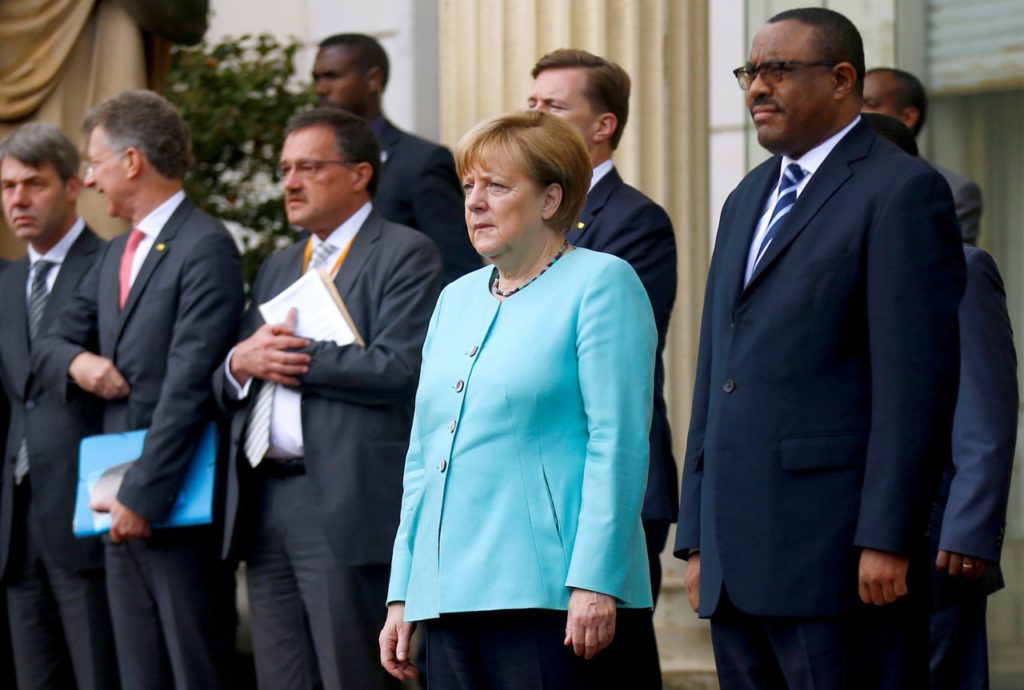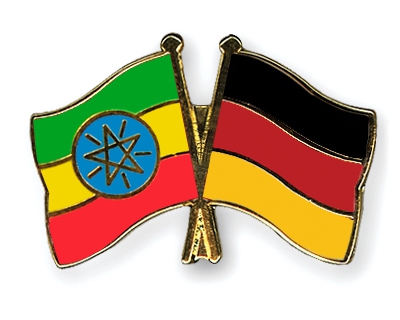 On 10 October 2016, German Chancellor Angela Merkel, made an official visit to Addis Abeba, Ethiopia where she met with Prime Minister Hailemariam Desalegn. The two leaders discussed on a range of issues including peace and security in the region, migration and refugees, natural resource conservation and development, democracy and good governance and trade and investment as well as the current situation in Ethiopia.
On 10 October 2016, German Chancellor Angela Merkel, made an official visit to Addis Abeba, Ethiopia where she met with Prime Minister Hailemariam Desalegn. The two leaders discussed on a range of issues including peace and security in the region, migration and refugees, natural resource conservation and development, democracy and good governance and trade and investment as well as the current situation in Ethiopia.
During a joint statement to the press, Prime Minister Hailemariam said the Chancellor’s visit to Ethiopia marks the beginning of a new chapter in the longstanding bilateral relation and development cooperation between Ethiopia and Germany.
He said the visit reaffirms the two sides’ commitment to lift the bilateral cooperation into a new high, adding that Ethiopia and Germany have had an excellent cooperation in human resources development, particularly in areas of water, engineering and education, which has significantly assisted farmers in Ethiopia.
The Prime Minister said Germany is providing assistance in human capacity development which takes center stage in the overall economic development. He said efforts of producing personnel in technical and vocational education and engineering fields is fruitful, with remarkable gains in raising productivity of smallholder farmers by acquiring lessons from Germany’s forest and land administration programs.
German owned businesses in Ethiopia are quite minimal as compared with other European and Asian countries, according to Hailemariam, who extended calls to German companies to do business in Ethiopia.
Asked about the current situation in Ethiopia, the Premier said the government is now undertaking series of relevant reforms with the full measure of addressing public demands. Among others, the country’s electoral law will be reformed following dialogues with opposition parties. He added various democratic platforms will also be put in place to maximize the full participation of all stakeholders and guarantee accountability and transparency.
Responding to whether security forces have used excessive force in a bid to contain the current protest and violence, Prime Minister Hailemariam said an investigation is underway by the Ethiopian Human Rights Commission. In this connection, he said “We launched this investigation not to please the international community, but we are responsible to our citizens.”
“Our democratization process is still nascent. It is moving at the right direction, but it has not yet come up with inclusive engagement”, the Prime Minister added.
Chancellor Angela Merkel noted that Ethiopia and Germany have achieved tremendous results in human resource capacity building, agriculture and rural development endeavors.
She said Ethiopia was able to improve the living standards of its citizens much due to the activities of the country’s poverty reduction efforts, which she said managed to lift many people out of poverty and offer educational opportunities for numerous youth in the past.
The Chancellor, however, stressed the need to work hard to meet the growing demand of the youth, while also expressing her country’s readiness to extend support to Ethiopia’s efforts of responding to the demands of the youth.
Touching upon the recent protests and violence in some parts of Ethiopia, Chancellor Merkel, while welcoming the government’s reform agenda, emphasized the need for dialogue between stakeholders. “I always argue that allowing people to express different political opinions and views is good because democratic experience shows that out of discussions and debates come out good solutions”. “The government has correctly identified the problems and has set ways to address them,” the Chancellor added.
On the need to intensify cooperation with Africa on migration and refugees, Merkel said the EU was ready to work together with the continent. “Africa’s economic development means a lot to European stability.” She further pledged to reinforce the financing of endeavors dedicated to dealing with migration and refugees.
The Chancellor indicated that her government encourages and supports German investors to do business in Ethiopia, promising further assistance to accommodating refugees in Ethiopia.
Furthermore, the two leaders have also discussed about regional issues, particularly ensuring peace and security in South Sudan and Somalia during which the Chancellor pledged to assist Ethiopia in promoting peace and stability in region.
During the German Chancellor’s visit the new Julius Nyerere Peace and Security Building in the premise of the African Union (AU) Headquarters located in Addis Ababa was inaugurated.
Prime Minister Hailemariam Desalegn, German Chancellor Angela Merkel and African Union Commission Chairperson, Nkosazana Dlamini Zum, inaugurated the new facility built at a cost of 27 million EUR with funds provided by the government of Germany.
This landmark project depicts the close cooperation that exists between the AU and Germany and goes a long way in enhancing the AU’s capacity to meet the challenges of peace and security on the continent.
Speaking during the grand inaugural event, the Chancellor said the relation between Africa and Germany rests on a common interest.
“Our cooperation is characterized by common effort for a sustainable economic development, education, governance and peace and security”.
She mentioned progresses in Africa including the continent’s economic potential, enormous natural resources and the growing middle class in many countries.
The Chancellor noted the huge number of youth in the continent that has hopes to change and many hopes that can be translated to a reality.
Africa’s sustainable growth and job creation requires the involvement of a strong private sector, she said, promising further support to development projects in the continent in a bid to tackle the root causes of migration from Africa to Europe.
African Union Commission Chairperson Dr. Nkosazana Dlamini Zuma on her part said Africa is ready to learn from Germany as the continent started implementing the Agenda 2063, the vision to Africa’s reconstruction.
The donation of the building is a visible monument of the spirit of solidarity and cooperation between Germany, the AU and Africa as a whole, the AUC Chair remarked.
Dr. Zuma said the building offers an important setting to take forward efforts of development and peace building as Africa is intensifying the silencing guns campaign.
The landmark project depicts the close cooperation that exists between the AU and Germany and goes a long way in enhancing the AU’s capacity to meet the challenges of peace and security on the continent.
The building hosts the AU Peace and Security Department, and provides a base for the operation of the continental early warning system and the coordination of peacekeeping missions.
Ethiopia hosts more than 800,000 refugees, mainly from neighboring African countries. Ethiopia has an open door policy that welcomes the refugees and give an economic and education opportunities to join universities, mainly to Eritrean and Somalia youth refugees. In November 2015 at the Valletta Summit, Ethiopia and the EU have signed a Common Agenda on Migration Agreement to resolve the root causes of migration in that part of the region and provide financial and technical assistances at project level.




